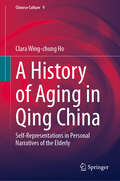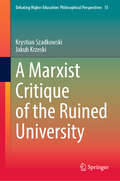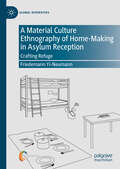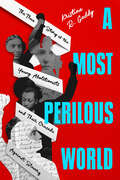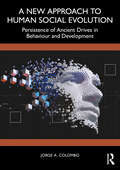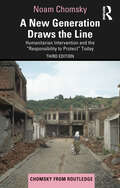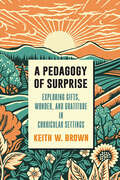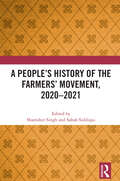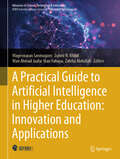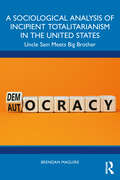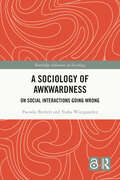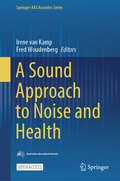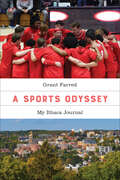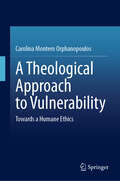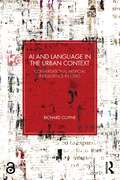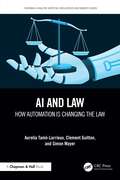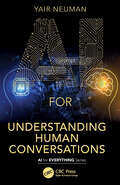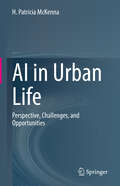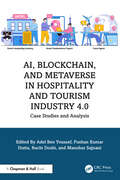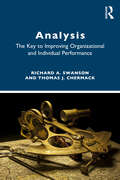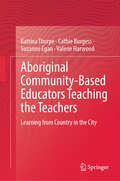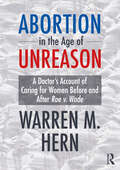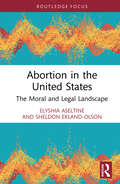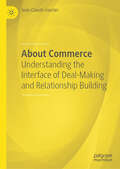- Table View
- List View
A History of Aging in Qing China: Self-Representations in Personal Narratives of the Elderly (Chinese Culture #9)
by Clara Wing-chung HoThis book examines the history of aging and old age during the Qing dynasty, a pivotal period marked by rapid population growth that resulted in the largest elderly population in imperial China. Drawing on previously overlooked first-person accounts from the extensive collections authored by Qing men and women, it offers an overview of the self-curated collective aging journeys of several hundreds of elders. By centering the voices of individuals reflecting on their aging experiences, this book delves into the personal narratives from both genders, rediscovering their aging journeys, revealing their subjectively constructed emotional landscapes, and giving a voice to the elderly individuals of the past. The chapters closely analyze how the elderly in Qing China articulated their aging process, channeling their joys, challenges, and frustrations in later life. History is not the monopoly of a single gender, class, race, or age group; without representations of the elderly, history remains incomplete. This book seeks to restore the elderly to the historical narrative and invites further discussion on Chinese historical gerontology as an emerging subfield. In addition to appealing to general readers interested in contemporary demographic issues from a historical perspective, this book will engage students and researchers of history, historical gerontology, aging studies, gender studies, cultural studies, sociology, psychology, and Asian studies.
A Marxist Critique of the Ruined University (Debating Higher Education: Philosophical Perspectives #15)
by Krystian Szadkowski Jakub KrzeskiThis book revitalizes the Marxian concept of critique for research into the transformation of universities. It consists of a set of comprehensive and interconnected theoretical tools, starting from the reflection on the political ontology of higher education, through the critique of political economy of the sector to the analysis of activist struggles within the universities, and back to the ontological concept of the common – a foundation for the university alternative design. The tools offered and discussed in context throughout the book allow for a productive use in overcoming the current crisis of the university, as well as to avoid the pitfalls present in contemporary debates around it. Unlike the dominant discussions on the university in crisis, the authors argue that to grasp its nature, one has to reach more profound than the level of appearances such as marketization and commodification. Szadkowski and Krzeski offer a compelling reappraisal of critique as a mechanism to liberate intellectual work. By linking critique to how knowledge is structured and commodified, they help us transcend reductionist narratives of a crisis-ridden University. Prioritising ontological renewal, they embrace the political and the common, enriching our collective ways of knowing the world as a movement. Pivoting around academic and student protests in Poland, the book enables us to imagine spaces and times of critical hope that resist the capitalist subjugation of intellectual activity to knowledge production. Richard Hall, Professor of Education and Technology, De Montfort University, Leicester, UK In the century since Antonio Gramsci new works in the Marxist tradition have made only modest contributions to social thought: the combined result of the savage repression in the West of the dangerous revolutionary ideas, plus the collapse in the East into jacobin conspiracy and dogmatism. If a living, vibrant Marxism had been part of the twentieth century mainstream then much catastrophe would have been averted. Now the drive for capital accumulation, sovereign individualism and rampant nationalism have brought us to the brink of ecological disaster and World War III. Into the void step two emerging scholars, Krystian Szadkowski and Jakub Krzeski with an original Marxist critique of higher education and the common good. There is hope in this development, vital resources for reflection, discussion and action. Simon Marginson, Professor of Higher Education at the Universities of Bristol and Oxford, UK, Honorary Professor at Tsinghua University in China, and Joint Editor in Chief of the journal 'Higher Education'
A Material Culture Ethnography of Home-Making in Asylum Reception: Crafting Refuge (Global Diversities)
by Friedemann Yi-NeumannThis book explores what it takes to create a sense of home while in exile, drawing on ethnographic research conducted in German asylum reception facilities from 2016-2020. From a material culture perspective, it examines how asylum seekers and migrants with precarious legal status ‘translate’ aspects of home into challenging environments. Through these translations—processual shifts of objects, habits, and ideas across borders—migrants work to reassemble a sense of belonging. The book delves into the material, social, and individual efforts involved in this homing process, while highlighting the ongoing impact of dispossession and loss. By focusing on personal attachments to objects and the broader context of migration, this work offers a unique perspective on forced migration, home cultures, and the quest for ontological security. The book will be of interest to scholars, researchers, and students in disciplines such as anthropology, sociology, and human geography as well as other research interested in ethnographic perspectives on the respective topics.
A Most Perilous World: The True Story of the Young Abolitionists and Their Crusade Against Slavery
by Kristina R. GaddyThe stories of the four teenage children of prominent abolitionists before and during the Civil War combine to form a surprisingly familiar tapestry of struggle, disappointment, and ultimately hope."Impeccable research and incredible details bring the stories of these four young people to life as they come of age in the years leading up to and during the Civil War."—Kip Wilson, award-winning author of White RoseFlowers in the Gutter author Kristina R. Gaddy tells the story of America&’s tumultuous years leading up to the Civil War and of the war itself from the viewpoints of four children of famous abolitionists, including those of Frederick Douglass and William Lloyd Garrison. Gaddy crafts a surprisingly contemporary coming-of-age narrative, supported by meticulous research and featuring dozens of primary documents. Each of these four young people—two white, two Black—was strongly committed to the anti-slavery cause but felt just as keenly a need to make their own names, away from the often over-protective or disapproving shadows of the famous adults in their lives. This is a true story of how a torch of resistance is passed and how a new generation makes its mark.
A New Approach to Human Social Evolution: Persistence of Ancient Drives in Behaviour and Development
by Jorge A. ColomboThis book provides an important examination into the role of evolution of human traits of dominance as central to understanding social and political events, proposing a new view on human social evolution. It also examines basic biological universal needs and behavioural profiles of non- human living beings, from which humans share essential survival components. It invites readers to think critically about the psychological evolution of the human brain. Using comparative psychology, it argues that the core of human behaviour lies in the ancient, animal, universal set of survival resources hidden under various socialization profiles. However, it generally fails to replace drives of dominance and aggression for physical and social survival. Genuine replacement of those primal behavioural drives would require fundamental neuro- socio- behavioural changes. This book supports the thesis that without education and the promotion of universal values involving environmental protection and individual opportunities to evolve, there will be negative consequences for individuals and communities. This book represents a critical tool for students of behavioural sciences, anthropology, politics, and evolutionary neurosciences, and will also greatly benefit other readers, such as teachers and professional researchers.
A New Generation Draws the Line: Humanitarian Intervention and the “Responsibility to Protect” Today (Chomsky from Routledge)
by Noam ChomskyIn this work, Chomsky explores the West’s uses and abuses of the principle of "human intervention." An updated foreword by Jean Bricmont explores the ongoing crises of humanitarian intervention in Afghanistan, Libya, Palestine, Syria, and Ukraine and reaffirms Chomsky’s excoriating critiques of Western foreign policy.Chomsky dissects the meaning and uses of humanitarian intervention grounded in the so-called "right to protect" (R2P). In doing so, Chomsky demonstrates how the principle of human intervention has been used as an instrument to justify military intervention in support of Western foreign policy aims. Through detailed case studies of the humanitarian intervention in East Timor and Kosovo, Chomsky also highlights how "humanitarian intervention" often leads to further atrocities and egregious abuses of human rights.As the question of humanitarian intervention looms ever larger, particularly with regard to the Middle East and Eastern Europe, this book is a vital overview of humanitarian intervention and its uses and abuses.
A Pedagogy of Surprise: Exploring Gifts, Wonder, and Gratitude in Curricular Settings
by Keith W. BrownCombines theory and practice to inspire teachers to embrace a sense of surprise in their classrooms.What would your classroom be like if you could see it as something surprising, novel, and fresh in every moment? What are the unique gifts that students and teachers alike bring to classrooms? Through a combination of robust theory, in-depth scholarship, and practical exercises for teachers, A Pedagogy of Surprise is a vital resource that allows teachers to explore how they can bring a sense of wonder, surprise, and gratitude into their experiences of the classroom. It will delight and inspire anyone with an interest in using contemplation, mindfulness, and reflection to enhance teacher wellness. Topics include how a phenomenology of surprise can inform and enhance the teaching and curricular experience, the gift economy as applied to the classroom, the meaning and scope of gratitude practices in curricular settings, and applications of surprise, gifts, and gratitude to teaching. The final chapter includes inspiring visualizations that teachers of any grade can apply to feel more gifted, surprised, and connected within their classroom milieu.
A People's History of the Farmers' Movement, 2020–2021
by Sabah Siddiqui Shamsher SinghIn the annals of India’s history, a monumental uprising unfolded in 2020, echoing the resilience and coming together of large sections of its agrarian base. Instigated by the contentious farm laws of 2020, the Farmers’ Movement burgeoned into a year-long saga of protest and perseverance, ending only in December 2021 after the passing of the Farm Laws Repeal Bill, 2021 by the Indian Parliament. From the initial demand for law repeal to the multifaceted growth of the movement, the book traces the journey of the Farmers’ Movement, as each essay dissects the socio-political dynamics, cultural nuances, and mass solidarity that underpinned the protests, including focused analyses from Delhi, Punjab, Haryana, Uttar Pradesh, Rajasthan, Maharashtra, and the Sikh diaspora in the United Kingdom. This anthology chronicles the ebb and flow of a nation’s spirit, encapsulating the symbiotic relationship between theory and praxis, between change and continuity. It serves as a testament to the power of collective resistance and a roadmap for future struggles, ensuring that the legacy of the Farmers’ Movement endures beyond the pages of history.This volume is an interdisciplinary project and will be of interest to scholars from diverse fields such as economics, sociology, public policy, political science, history, political geography, gender studies, cultural studies, international studies, architecture, media studies, psychology, and ethnomusicology.
A Practical Guide to Artificial Intelligence in Higher Education: Innovation and Applications (Advances in Science, Technology & Innovation)
by Mageswaran Sanmugam Zuheir N. Khlaif Wan Ahmad Jaafar Wan Yahaya Zaleha AbdullahThis book explains how educators can use artificial intelligence in education to enhance student engagement and improve learning outcomes by sharing best practices for using AI to enhance learning quality and foster sustainable teaching. This book covers various topics related to the use of AI in education, from designing activities to using AI in teaching to using AI in assessment by following the ethical considerations of using AI in teaching. The book not only discusses the related topics to using AI in education, but also presents best practices of using AI in teaching and learning from different countries and provides best practices of ethical considerations based on lives experiences of the authors. Furthermore, the book introduces the teaching methods of integrating AI in teaching and learning. Therefore, this book offers essential information and a practical guide to using AI in education.
A Sociological Analysis of Incipient Totalitarianism in the United States: Uncle Sam Meets Big Brother
by Brendan MaguireUsing George Orwell’s novel Nineteen Eighty-Four as a guide for interpreting the role of the American state in the twenty-first century – paying particular attention to how the government responded to the life and death issues of terrorism, COVID-19, and climate change – this book presents eye-opening and compelling documentary evidence that suggests Orwellian policies have already been implemented by Republicans and Democrats.A Sociological Analysis of Incipient Totalitarianism in the United States advances a groundbreaking sociological explanation for how totalitarian rule is embraced by the public when freedom, equality, and justice are compromised, offering a sociological explanation of how totalitarian rule is operationalized from the macro level to the micro level, using concepts associated with Marx (ruling ideas), Mead (generalized other) and Berger and Luckmann (recipe knowledge) which are especially key to understanding the process. Finally, the book suggests policies that could halt and reverse the progression of totalitarianism in the United States.Scholarly and yet readily accessible to a general readership, this book showcases the sociological importance and enduring influence of Orwell – working as a supplement to Orwell’s Nineteen Eighty-Four and making a meaningful contribution to the public discourse by challenging and informing students and the public about the very real fears of creeping totalitarianism in the United States.
A Sociology of Awkwardness: On Social Interactions Going Wrong (Routledge Advances in Sociology)
by Pauwke Berkers Yosha WijngaardenA Sociology of Awkwardness shows how awkward feelings are the outcome of social interactions going wrong.Combing insights from cultural sociology and the sociologies of interactions and emotions, this book develops the first comprehensive sociology of awkwardness. It provides an understanding of how people define, express, and experience awkwardness, while locating its causes not within individuals but within social interactions. The book also offers a unique perspective by examining how both time and space contribute to the experience of awkwardness. Additionally, it delves into the various ways people deal with awkward interactions. A Sociology of Awkwardness introduces a novel theory and typology of awkwardness, drawing from rich empirical data of everyday encounters, work, dating, and self-help. This book will appeal to scholars across the social sciences, particularly those interested in culture, social interactions, and emotions. It will also attract readers seeking to understand awkwardness as a cultural phenomenon, though not as a self-help guide.
A Sound Approach to Noise and Health (Springer-AAS Acoustics Series)
by Irene Van Kamp Fred WoudenbergThis open access book highlights the negative and positive health effects of chronic exposure to environmental sound. It describes the state of the art in the field from a public health point of view and puts it in a broad societal perspective looking at sound from physical, social, psychological, economic and governance angles. Rather than a mere collection of papers around the theme as usually provided in special issues, this book offers a comprehensive look at the meaning of sound in society and its impacts and provides directions to further advance the field.
A Sports Odyssey: My Ithaca Journal (Sporting)
by Grant FarredGrant Farred has long had a passionate connection with sports. In A Sports Odyssey, he weaves together an account of his own sports fandom that is profoundly personal and universal. As readers of his Long Distance Love know, Grant Farred has been a supporter of the English Premier League club, Liverpool Football Club, for decades. His fandom for that team launched an unexpected connection with a world beyond the limits of the apartheid state of his upbringing in South Africa. However, A Sports Odyssey shows that as Farred’s fervor for Liverpool ended, he developed a new set of sports attachments in Ithaca, New York: to his son’s youth basketball career, to the men’s basketball team at Cornell University and its coach, and even to professional teams like the New York Knicks. Farred’s bemusement at finding himself a sports parent, a New Yorker, and a company man, only underline the sincerity of his affections. In A Sports Odyssey, Farred writes elegantly and eloquently about how sports and sports fandom create a sense of belonging, but also loss. This is a heartfelt examination of how we find “home” in who and what we love. In the series Sporting
A Theological Approach to Vulnerability: Towards a Humane Ethics
by Carolina Montero OrphanopoulosThis book explores the symbols of vulnerability, narratives of vulnerability, and ethical norms of vulnerability in the Bible. Focusing on the great Tradition of the Church—from Stoic and Neoplatonic influence to the Moral Systems—and the approach to the Second Vatican Council, the volume helps to comprehend, deepen and clarify the concept of vulnerability. As a theory, it addresses the construction of ethics of vulnerability, its characteristics, the fundamental categories it should include. Reinforced by “An Interdisciplinary Approach to Vulnerability: Towards a Humane Ethics (Vol I)”, written by the same author, this book hopes to lead the discourse of Christian ethics towards a better understanding and ultimately build towards a greater integration of the vulnerability of the human being.
A User's Guide to the Age of Tech (Electronic Mediations)
by Grant WythoffHow users experience and influence technological change—when so much of that change feels out of our control Every day, we casually employ one of the most complex tools ever created, using it to read the news, plan our day, and connect with friends. In A User&’s Guide to the Age of Tech, Grant Wythoff investigates the process by which now-ubiquitous technologies like our phones become integrated into our lives, showing how the &“gadget&” stage—before devices are widely adopted—opens the door for users to co-create these technologies and adapt them toward unexpected ends. In this elegant, approachable work, Wythoff offers a view of how users make new technology their own, subverting dominant power structures and imagining uses never intended by their creators. Rooted in a detailed look into the history of technique (focusing on how we do things with tools rather than the tools themselves), A User&’s Guide to the Age of Tech proceeds to complicate, and influence, discussion of subjects like the digital divide and AI. Drawing on a range of sources, including novels, patents, and newspapers, Wythoff explores the vernacular philosophies that have emerged from users and their diverse, everyday practices, bringing down to earth the conversation about digital titans, away from the abstracted domains of server farms and algorithms. Lodging a passionate argument that we know ourselves better than the data brokers who appear to wield influence over our psyches, Wythoff invites readers (and tech users) to imagine their own digital technique, acknowledge their vast expertise, and see its immense value. Retail e-book files for this title are screen-reader friendly with images accompanied by short alt text and/or extended descriptions.
AI and Language in the Urban Context: Conversational Artificial Intelligence in Cities
by Richard CoyneIn a world influenced increasingly by artificial intelligence (AI), the city emerges as a dynamic hub of digital conversations. AI and Language in the Urban Context offers a novel exploration of how AI, particularly large language models (LLMs), is transforming urban environments. Moving beyond the typical technological narratives, this book draws on the author’s unique expertise in design, semiotics and hermeneutics to present a critical cultural perspective on AI’s role in the city.Focusing on the intersection of urban theory and AI, the book reveals how conversational AI is reshaping social interactions, decision-making processes, and media in urban spaces. By merging practical knowledge of AI algorithms with an understanding of urban practices, the author highlights the opportunities and challenges AI presents for modern cities.This book is essential for anyone interested in the future of urban living. It provides a deep dive into the technical, social and cultural implications of AI in cities, offering practical examples and philosophical insights. Readers will gain a comprehensive understanding of how AI is influencing the design, governance and dynamics of urban life in the digital age.The Open Access version of this book, available at www.taylorfrancis.com, has been made available under a Creative Commons [Attribution-Non Commercial-No Derivatives (CC-BY-NC-ND) 4.0 license.
AI and Law: How Automation is Changing the Law (Chapman & Hall/CRC Artificial Intelligence and Robotics Series)
by Aurelia Tamo-Larrieux Clement Guitton Simon MayerThis book provides insights into how AI is changing legal practice, government processes, and individuals’ access to those processes, encouraging each of us to consider how technological advances are changing the legal system. Particularly, and distinct from current debates on how to regulate AI, this books focuses on how the progressive merger between computational methods and legal rules changes the very structure and application of the law itself.We investigate how automation is changing the legal analysis, legal rulemaking, legal rule extraction, and application of legal rules and how this impacts individuals, policymakers, civil servants, and society at large. We show through many examples that a debate on how automation is changing the law is needed, which must revolve around the democratic legitimacy of the automation of legal processes, and be informed by the technical feasibility and tradeoffs of specific endeavors.
AI for Understanding Human Conversations (AI for Everything)
by Yair NeumanArtificial intelligence (AI) and specifically large language models (LLMs) revolutionize our lives with new technologies appearing at an unprecedented rate. These technologies can potentially change how we understand human conversations, from the dialogues of married couples to diplomatic conversations.This book explains how to use LLMs to analyze human conversations and how better LLMs can be developed by incorporating a deep theoretical understanding.Drawing on case studies from Pulp Fiction to diplomatic meetings, the book provides detailed, approachable, and theoretically grounded explanations of how LLMs can help us understand conversations.
AI in Urban Life: Perspective, Challenges, and Opportunities
by H. Patricia McKennaIn exploring artificial intelligence (AI) in urban life, this book brings together and extends thinking on how human-AI interactions are continuously evolving. Through such interactions, people are aided on the one hand, while becoming more aware of their own capabilities and potentials on the other hand, pertaining, for example, to creativity, human sensing, and collaboration. It is the particular focus of research questions developed in relation to awareness, smart cities, autonomy, privacy, transparency, theory, methods, practices, and collective intelligence, along with the wide range of perspectives and opportunities offered, that set this work apart from others. Conceptual frameworks are formulated for each of these areas to guide explorations and understandings in this work and going forward. A synthesis is provided in the final chapter for perspectives, challenges and opportunities, and conceptual frameworks for urban life in an era of AI, opening the way for evolving research and practice directions.
AI, Blockchain, and Metaverse in Hospitality and Tourism Industry 4.0: Case Studies and Analysis
by Pushan Kumar Dutta Adel Ben Youssef Ruchi Doshi Manohar SajnaniThe book offers a critical exploration of the integration of AI, blockchain, and metaverse technology in the hospitality and tourism industry to investigate the potential of these technologies in revolutionizing the industry. This comprehensive work studies, with practical examples, how cutting-edge technologies of Industry 4.0 are transforming luxury industry into a high-touch, hyper-personalized metaverse. It explains how these technologies can be used to improve customer experience and operational efficiency in areas such as guest interaction, supply chain management, payment processing, and virtual stores. The book also discusses the conditions that can promote sustainable development in the hospitality industry using Industry 4.0 technologies. Provides an innovative perspective by blending high-tech trends like AI, blockchain, and metaverse with traditional wellness practices Emphasis on ethical considerations and potential risks associated with the use of these technologies, providing a balanced perspective on their impact Includes case studies and practical examples on how businesses can use AI, blockchain, and the metaverse to improve customer experiences and operational efficiency Explores how the hospitality industry can embrace Industry 4.0 technologies to improve its operations, enhance customer experiences, and contribute to sustainable development Provides a roadmap for companies looking to implement these technologies, highlighting potential benefits and pitfalls of each approach This reference book is for scholars and professionals in computer science who are interested in studying the effect of AI, blockchain, and metaverse in hospitality and tourism industry.
ANALYSIS: The Key to Improving Organization and Individual Performance
by Richard A. Swanson Thomas J. ChermackWith the volatile nature of today’s workplaces, analysis tools are more valuable than ever: this book provides those tools to capture human expertise before it leaves the organization.The concepts of analysis may be timeless, but recent years have seen massive changes in terms of organizational structures, work systems, and worker requirements, such as remote working and increased employee turnover. This book covers the theory and concepts behind performance improvement, and then turns to the real-world work of performance diagnosis, process improvement, and task documentation, introducing cross-functional task analysis, which recognizes the changing nature of work as more of today’s tasks are extensive and require collaboration across jobs. Each chapter can stand alone if organizations need to focus on a particular area, and includes examples that reflect contemporary work, from job descriptions to task inventories and specific task analyses.One of the only texts providing the tools and processes necessary to analyze workplace performance, document human expertise, and develop training materials, this book is intended for managers, executives, students, and any workplace or organization development professional interested in human expertise and how to manage it.
Aboriginal Community-Based Educators Teaching the Teachers: Learning from Country in the City
by Suzanne Egan Valerie Harwood Katrina Thorpe Cathie BurgessThis book showcases the transformative impact of Aboriginal community-based educators teaching local histories and cultures to preservice teachers. It details the &‘Learning from Country in the City&’ teaching and research project, which follows preservice teachers who participated in immersive &‘Learning from Country&’ experiences in undergraduate Aboriginal education electives through to their first few years of teaching. Through storying Aboriginal community-based educator, preservice and early career teacher, and lecturer experiences, this book demonstrates the educational and emotional impact of Aboriginal truth telling processes and the significance of connecting with and learning from Country for all teachers and students. A visual representation of the pedagogical framework articulates this work which is designed to capture localised place-based learning processes and apply these principles to diverse contexts. The book presents photographs and maps of the places at the centre of this learning so educators, community members and readers can visualise how they might apply this methodology to their context. Importantly, this book positions Indigenous Knowledges, Aboriginal voices and ways of knowing, being and doing front and centre - asserting that this is essential foundational work needed to prepare young people for living in an ever-changing world.
Abortion in the Age of Unreason: A Doctor's Account of Caring for Women Before and After Roe v. Wade
by Warren M. HernThis vivid account by a nationally prominent doctor reports the daily challenges of offering and receiving abortion services in a volatile political and social atmosphere. In stories from the front lines – from protecting patients and staff from protesters’ attacks to the dangers to women of restricted access to abortion services, and the pertinent findings of his remote research in Latin America, Hern’s book is strikingly detailed just as it exposes the needs of women and the U. S. national interest. Dr. Hern – an abortion specialist, researcher, scholar, and highly visible public advocate –shows how abortion saves women’s lives given the many risks that arise during pregnancy – remarkably more than most people realize. He points to political and national solutions to reverse a reawakened crisis that now threatens democracy. Throughout the book, Dr. Hern shows how the current emergency was largely created by political actors who have exploited and distorted the abortion issue to increase and consolidate their power.A vital component of women’s health care, the crisis over abortion is not new. Yet the reversal of Roe v. Wade and the steady accumulation of power by America’s right wing has put the issue at a level of urgency and national prominence not seen since the days before legalization. Women’s need for safe abortion services will continue as the struggle to secure their rights intensifies. This book is about that struggle during what has evolved, over the last 50 years, to an Age of Unreason.
Abortion in the United States: The Moral and Legal Landscape
by Elyshia Aseltine Sheldon Ekland OlsonThis book explores the seismic shift brought about by the 2022 US Supreme Court decision in Dobbs v. Jackson Women’s Health Organization, which dramatically changed the constitutional standing of abortion decisions set in place by Roe v. Wade 50 years earlier. The authors describe the history of US Supreme Court’s decision-making around abortion and some of its attendant considerations, including the constitutional right to privacy, moral obligations to protect life, and determinations about when life begins.When Dobbs was decided, legal control over abortion was returned to the states, resulting in wildly divergent access to abortion across the nation. As important, Dobbs raised a host of additional legal and moral questions that will no doubt be the focus of many future courtroom and legislative debates.This text is designed for undergraduate students across a range of academic disciplines. It lays bare the complicated moral dimensions of the competing arguments about abortion and how these considerations have fared in legal decisions, so students can make sense of them for themselves.
About Commerce: Understanding the Interface of Deal-Making and Relationship Building
by Jean-Claude UsunierThe word &‘commerce&’ is infrequently used in contemporary business speak and, when it is, it is typically as a somewhat archaic synonym for business or trade, or otherwise in the context of &‘e-commerce&’. This book defines commerce by its traditional meaning, as the activity of transaction and exchange, and explores the corresponding interaction of human behaviour and economic interests. This book develops not only an understanding of the ambiguous interface between deals and relationships, but also the skills to manage it according to the situations and contexts in which it arises. The aim is to use advances on the fundamental phenomena of economic exchange (trust, reciprocity, altruism, reputation, etc.) and to apply them to a detailed explanation of the ins and outs of commerce. Of great interest to scholars and students of marketing, organisational behaviour and economics, this book attempts to bring together these advances to focus on the commercial phenomenon and propose a synthetic approach to the exchange relationship.
